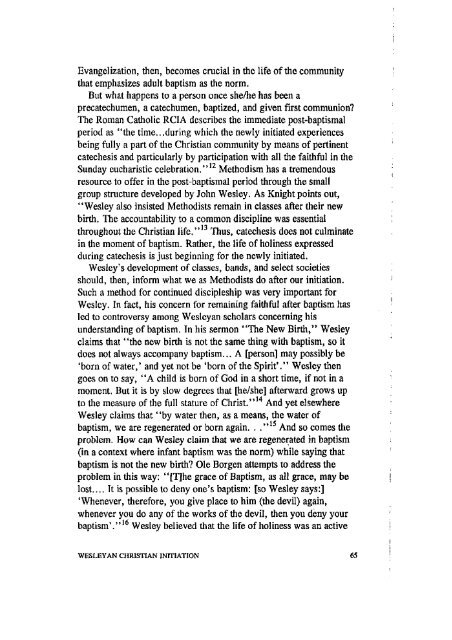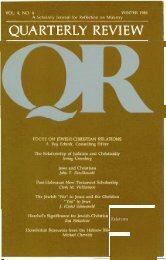TJieodore W. Jennings, Jr. The Meaning of ... - Quarterly Review
TJieodore W. Jennings, Jr. The Meaning of ... - Quarterly Review
TJieodore W. Jennings, Jr. The Meaning of ... - Quarterly Review
You also want an ePaper? Increase the reach of your titles
YUMPU automatically turns print PDFs into web optimized ePapers that Google loves.
Evangelization, then, becomes crucial in the life <strong>of</strong> the community<br />
that emphasizes adult baptism as the norm.<br />
But what happens to a person once she/he has been a<br />
precatechumen, a catechumen, baptized, and given first communion?<br />
<strong>The</strong> Roman Catholic RCIA describes the immediate post-baptismal<br />
period as "the time,..during which the newly initiated experiences<br />
being fully a part <strong>of</strong> the Christian community by means <strong>of</strong> pertinent<br />
catechesis and particularly by participation with all the faithful in the<br />
Sunday eucharistic celebration." 12<br />
Methodism has a tremendous<br />
resource to <strong>of</strong>fer in the post-baptismal period through the small<br />
group structure developed by John Wesley. As Knight points out,<br />
"Wesley also insisted Methodists remain in classes after their new<br />
birth. <strong>The</strong> accountability to a common discipline was essential<br />
throughout the Christian life." 13<br />
Thus, catechesis does not culminate<br />
in the moment <strong>of</strong> baptism. Rather, the life <strong>of</strong> holiness expressed<br />
during catechesis is just beginning for the newly initiated.<br />
Wesley's development <strong>of</strong> classes, bands, and select societies<br />
should, then, inform what we as Methodists do after our initiation.<br />
Such a method for continued discipleship was very important for<br />
Wesley. In fact, his concern for remaining faithful after baptism has<br />
led to controversy among Wesleyan scholars concerning his<br />
understanding <strong>of</strong> baptism. In his sermon "<strong>The</strong> New Birth," Wesley<br />
claims that "the new birth is not the same thing with baptism, so it<br />
does not always accompany baptism... A [person] may possibly be<br />
'born <strong>of</strong> water,' and yet not be 'born <strong>of</strong>the Spirit'." Wesley then<br />
goes on to say, "A child is born <strong>of</strong> God in a short time, if not in a<br />
moment. But it is by slow degrees that [he/she] afterward grows up<br />
to the measure <strong>of</strong> the full stature <strong>of</strong> Christ." 14<br />
And yet elsewhere<br />
Wesley claims that "by water then, as a means, the water <strong>of</strong><br />
baptism, we are regenerated or born again. . ," 15<br />
And so comes the<br />
problem. How can Wesley claim that we are regenerated in baptism<br />
(in a context where infant baptism was the norm) while saying that<br />
baptism is not the new birth? Ole Borgen attempts to address the<br />
problem in this way: "[TJhe grace <strong>of</strong> Baptism, as all grace, may be<br />
lost.... It is possible to deny one's baptism: [so Wesley says:]<br />
'Whenever, therefore, you give place to him (the devil) again,<br />
whenever you do any <strong>of</strong> the works <strong>of</strong> the devil, then you deny your<br />
baptism'." 16<br />
Wesley believed that the life <strong>of</strong> holiness was an active<br />
WESLEYAN CHRISTIAN INITIATION 65












